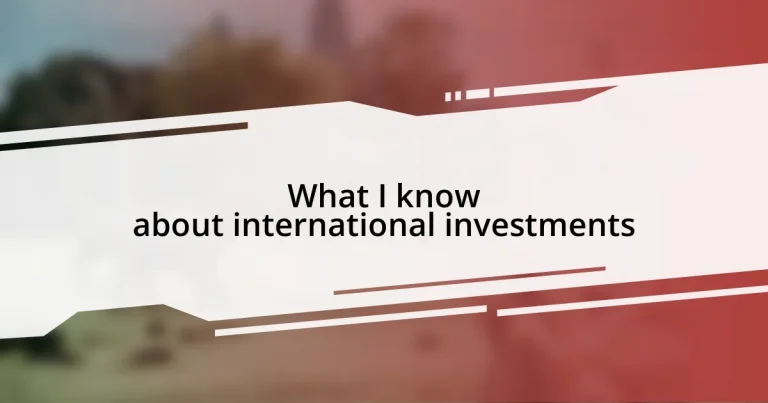Key takeaways:
- International investments provide portfolio diversification, accessing growth opportunities in emerging markets while reducing overall risk.
- Key considerations include market stability, local regulations, and currency risk, all essential for informed investment decisions.
- Leveraging local expertise and setting clear investment goals enhance the success of international investing strategies.
- Understanding cultural nuances and economic indicators is crucial for effectively analyzing foreign markets and making informed choices.
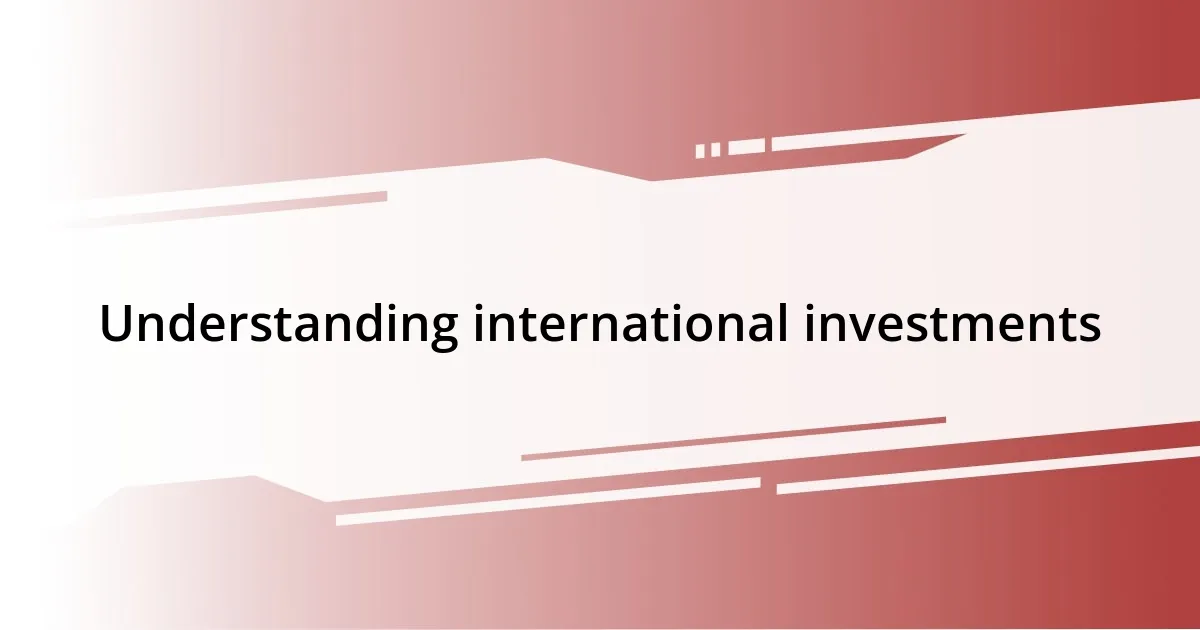
Understanding international investments
When I first dipped my toes into international investments, I remember feeling an exhilarating mix of excitement and apprehension. Understanding how different markets operate can be daunting, especially when geopolitical events play a role in market dynamics. Have you ever wondered how foreign currency fluctuations might impact the value of your investments? It’s fascinating yet intricate—something I’ve learned to navigate over the years.
The beauty of international investments lies in their potential to diversify your portfolio. Imagine having a slice of emerging markets alongside established economies; it can be like adding different flavors to a dish to enhance its overall taste. I still recall the first time I invested in a foreign company; it wasn’t just numbers on a screen—it was an opportunity to share in their growth story.
However, it’s essential to grasp the risks involved. I won’t forget the sharp lessons learned during market downturns; witnessing a sudden drop in my investments taught me the importance of thorough research and strategic planning. Isn’t it true that the more you know, the more empowered you feel? Investing internationally isn’t just about chasing returns—it’s about understanding the broader context and making informed choices.
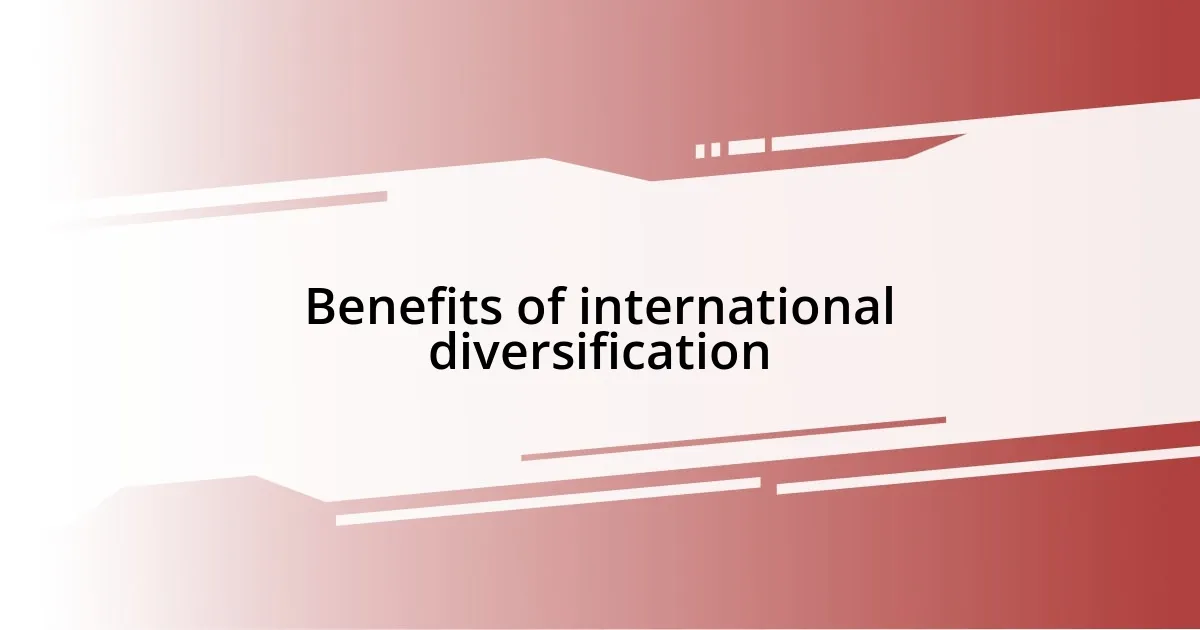
Benefits of international diversification
Expanding your investments internationally can unlock numerous advantages. One of the most significant benefits is risk reduction through diversification. I’ve found that different economies often react differently to global events. For instance, during a downturn in the U.S. market, my investments in European and Asian sectors surprisingly held their ground. It was a comforting realization that not all markets move in sync, and this buffer can help mitigate losses.
- Access to Growth Opportunities: Investing in emerging markets can provide exposure to high-growth sectors that might not be available domestically.
- Currency Hedging: International investments can serve as a hedge against domestic currency volatility. When your home currency weakens, the value of your foreign investments can increase.
- Broader Market Exposure: By diversifying internationally, you can tap into different market cycles and trends, enhancing your potential for returns.
- Improved Portfolio Resilience: An international portfolio can withstand localized economic downturns better than one concentrated solely in your home country.
- Cultural Insights: Engaging with foreign markets can provide valuable perspectives and insights about global economic dynamics, enriching your overall investment knowledge.
I remember the thrill I felt when I realized that investing in foreign stocks wasn’t just about finances—it was about embracing the world. Each company I invested in had its unique challenges and contributions to the global economy. This perspective broadened my view on the interconnectedness of markets, making my investment journey feel much more enriching.

Key factors to consider
When considering international investments, one of the first factors I evaluate is market stability. I often ask myself, “How politically stable is this country?” A stable government can lead to a more predictable business environment, which is crucial for making informed investment decisions. My experience has shown that investing in unstable regions can be risky; I learned this the hard way when an unexpected coup affected my investments in a developing nation.
Another key factor is understanding local regulations and taxation. I remember embarking on a journey to invest in a foreign market only to discover complex laws that impacted my returns. Knowing the legal landscape can save you from unpleasant surprises down the road. Knowledge is truly power in international investing, and I always recommend consulting local experts or resources to ensure you’re well-informed.
Lastly, currency risk is something I can’t overlook. The impact of currency exchange rates on investment performance can be dramatic. I once held foreign stocks that seemed promising, but the depreciation of the local currency against my home currency significantly affected the overall returns. I often remind myself to evaluate how currency fluctuations could impact not only profits but overall investment strategy.
| Factor | Considerations |
|---|---|
| Market Stability | Evaluate the political climate and its effects on business operations. |
| Local Regulations | Understand the legal framework and taxation policies of the country. |
| Currency Risk | Assess potential impacts of currency fluctuations on investment returns. |
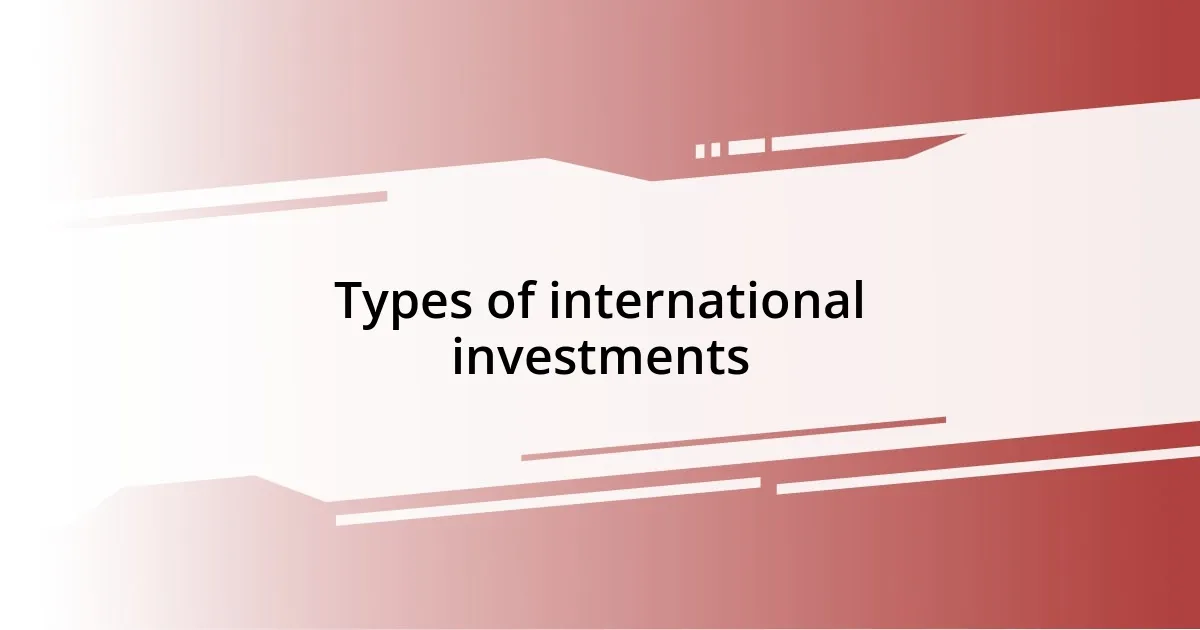
Types of international investments
When I think about types of international investments, I immediately consider direct investments like foreign stocks and bonds. There’s something exhilarating about analyzing a company’s growth potential halfway across the globe, knowing my money could help fuel its success. I remember a time when I purchased shares in a promising tech startup in Asia; it was thrilling to think I was contributing to innovation outside my local market.
Another avenue I’ve explored is real estate investments. Investing in properties abroad can be a fantastic way to diversify. However, it comes with its own set of challenges. I once dabbled in vacation rentals in a vibrant European city, and realizing the local laws around short-term rentals felt like a crash course in international regulations. Has anyone else faced the steep learning curve of navigating foreign real estate markets?
Then there are mutual funds and ETFs that focus on international markets, which I often recommend to those just starting out. They offer a less risky entry into global investing since they pool many different investments. I vividly recall how I felt relieved when my friend first dipped her toes in investing through an international mutual fund, allowing her to explore diverse economies without needing to handpick individual stocks. It was a gentle yet impactful way for her to expand her horizons.
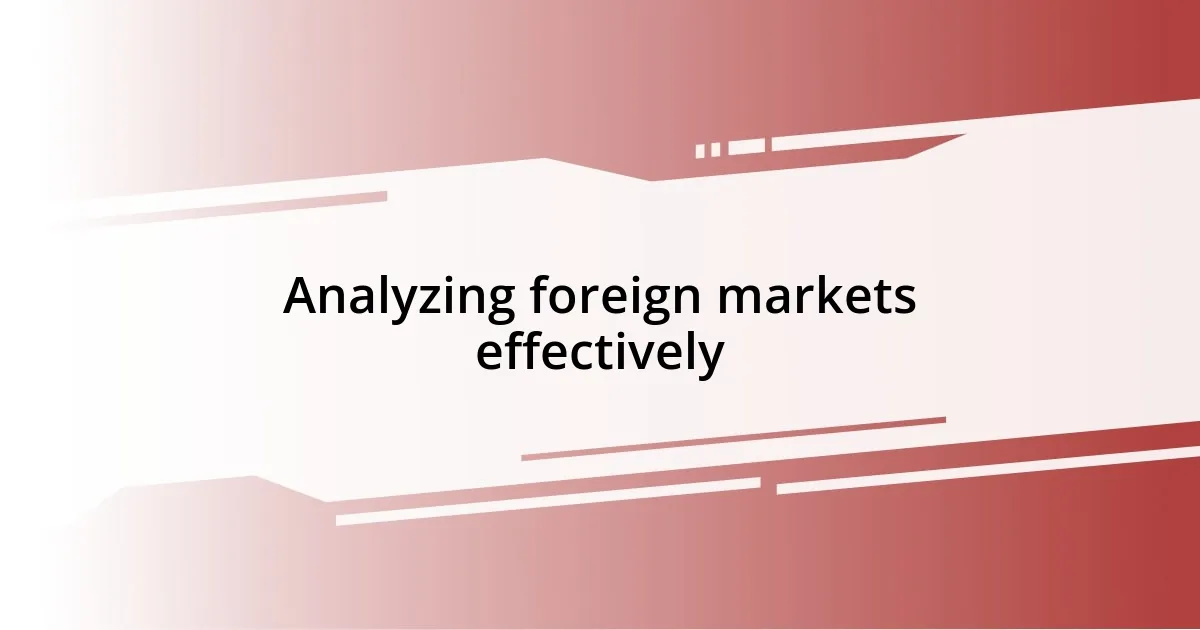
Analyzing foreign markets effectively
When analyzing foreign markets, I find that understanding cultural nuances is crucial. I once underestimated the importance of local business etiquette when I entered a market in South America. Misinterpreting a casual business meeting as formal led to some rather awkward exchanges, making it clear that cultural sensitivity can make or break a deal. Have you ever found yourself in a similar situation, where a cultural misstep turned a promising interaction into a challenge?
Another aspect I pay close attention to is economic indicators. I’ve learned to watch GDP growth rates, inflation, and employment numbers closely, as these metrics provide valuable insights into a country’s economic health. For instance, during my analysis of a Southeast Asian market, I noticed a rising GDP coupled with low unemployment, which gave me confidence to invest in local startups. It made me wonder, how often do we overlook these simple yet telling indicators when making decisions?
Finally, building a network in the foreign market is something I deem essential. I remember relocating to a new country for a while, and the relationships I formed with local investors provided me with insights I simply couldn’t have gained on my own. These connections opened doors to opportunities and strategies that enabled my investments to thrive. Isn’t it interesting how sometimes, it’s not just what you know but who you know that truly matters in international investing?
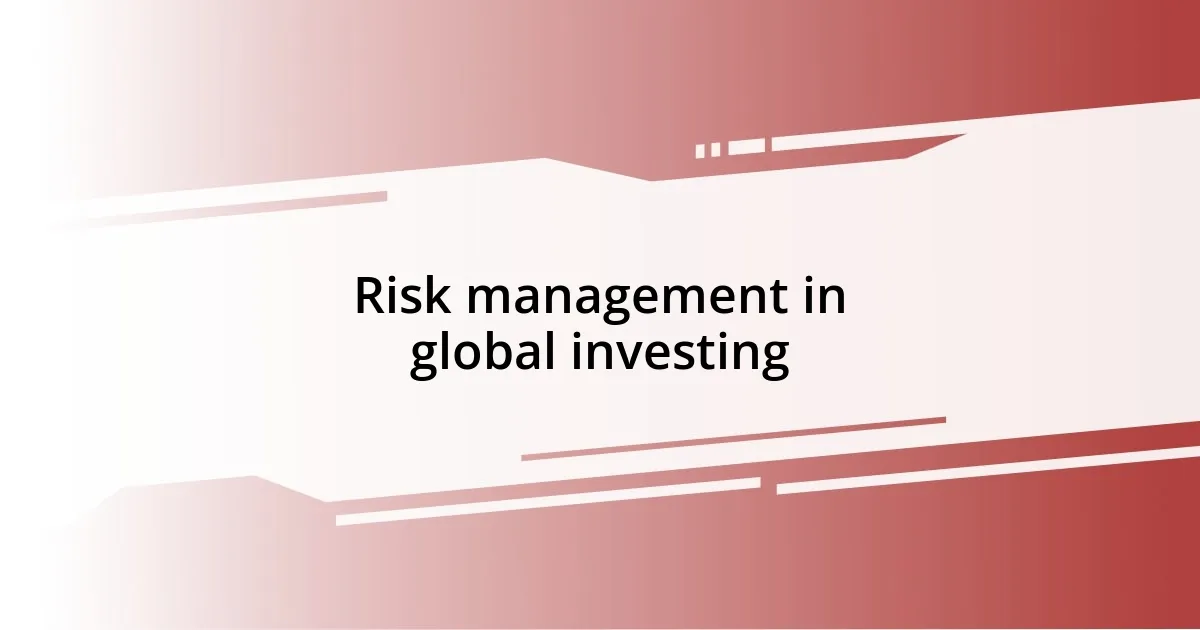
Risk management in global investing
When it comes to risk management in global investing, I’ve realized that a diversified portfolio is essential. I often think back to a period when I had too much capital concentrated in emerging markets, and a sudden economic downturn left me feeling anxious. This experience taught me the importance of spreading investments across various regions and sectors to mitigate potential losses. Are you considering how well-balanced your own portfolio is?
Another critical aspect I’ve encountered is understanding geopolitical risks. I remember discussing investment strategies with a friend who had assets in a politically unstable country. While he believed in the long-term potential, I couldn’t shake the feeling of unease. I realized then that staying informed about political climates and policies is crucial for anticipating how global events can influence market conditions. Have you ever felt the weight of geopolitical risk on your investment choices?
Lastly, currency fluctuations can dramatically impact your returns, and I learned this the hard way. I once invested in a promising foreign company whose stock was gaining value, only to watch my profits dwindle because of an unfavorable exchange rate. It was a bitter lesson that reminded me to factor in currency risk when evaluating international opportunities. Have you ever experienced a similar shock, where the currency market plays a decisive role in your investing adventure?
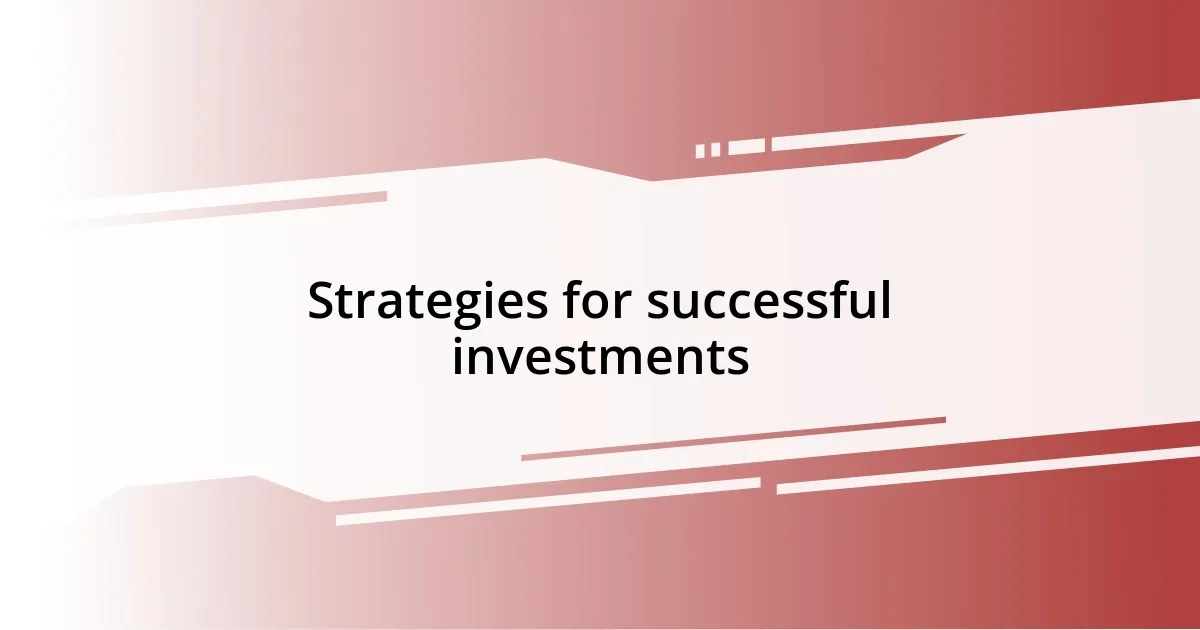
Strategies for successful investments
When it comes to strategies for successful investments, one of the most effective approaches I’ve found is to leverage local expertise. I vividly remember partnering with a local advisor when I started investing in a European market. Their deep understanding of regional trends and regulations not only saved me from making costly mistakes but also provided insights into consumer preferences that I would have otherwise missed. Have you thought about who could be your local expert?
Another essential strategy is to set clear investment goals. I’ve learned through trial and error that defining what I want to achieve helps streamline my decision-making process. Once, I entered a promising venture without a well-defined goal, which left me feeling lost as I navigated through conflicting priorities. I realized then that having specific and measurable objectives can serve as a roadmap guiding me through the complexities of international investing. What goals do you have for your investment journey?
Finally, I find that ongoing education about market trends is vital. During my early days as an investor, I often relied on outdated materials, thinking they sufficed. However, after immersing myself in webinars and podcasts, I rapidly discovered how much more dynamic the investing landscape is. For example, after attending a seminar on technology trends in Asia, I recognized emerging opportunities that I wouldn’t have considered otherwise. How do you keep yourself informed of the latest trends affecting your investments?












